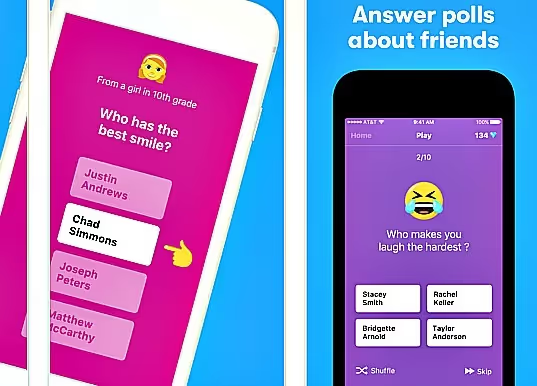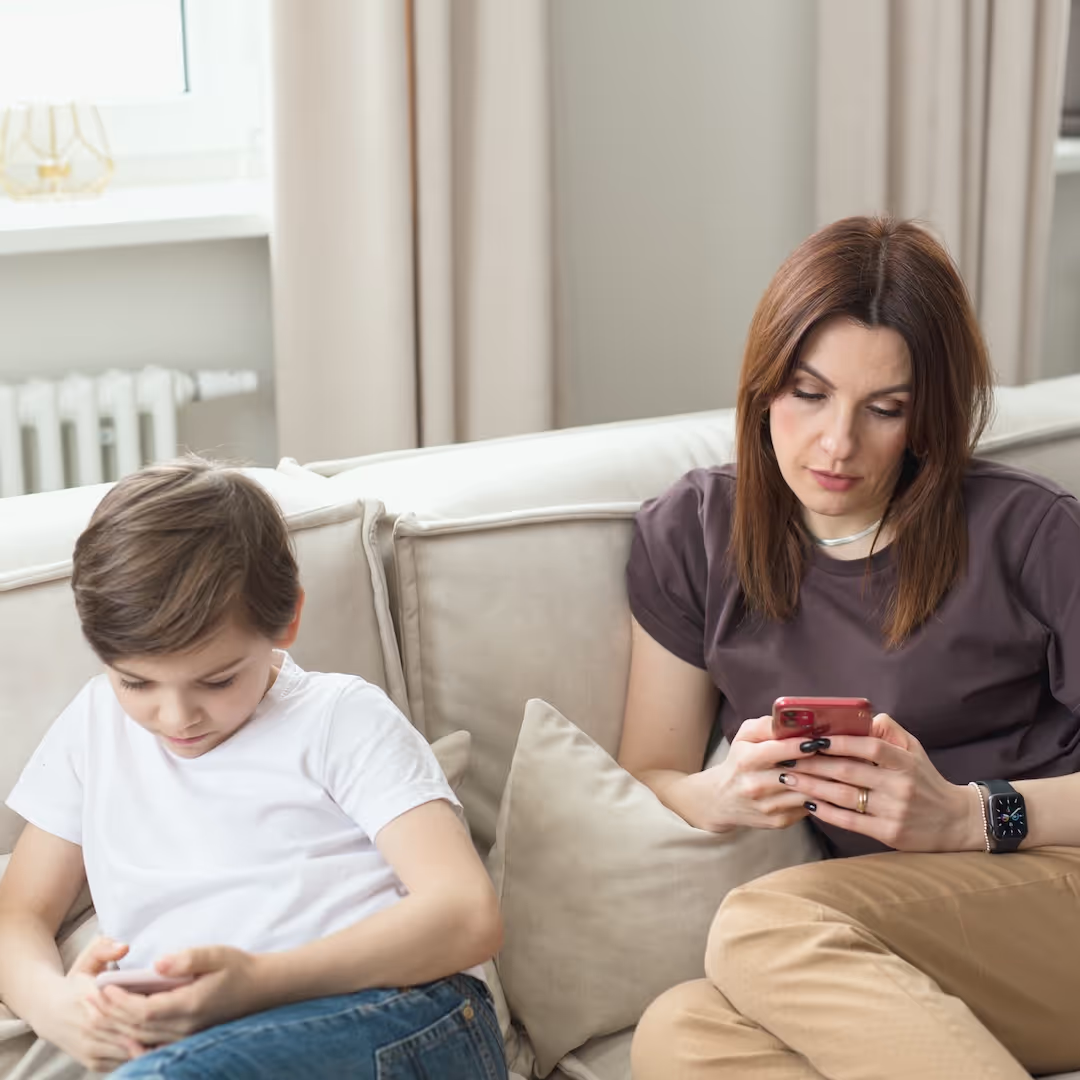


The latest app to join the social networking roster, TBH (To Be Honest) is meant to share positive vibes. Users anonymously receive and can send superlatives, such as “Best person to get a cup of coffee with?" or "Who is most likely to keep in touch with friends after ten years? "
TBH was the most popular download in the iTunes store in late September 2017. It is only available for iPhones and is only available in a select number of states.
The user, let's call her Julie, downloads the app and gives TBH her grade and school. The app uses that info, along with her contact list, to push out invites to Julie’s friends to see if they will join her TBH friend list.
Julie will get a positive statement, such as “most likely to succeed,” and four names of people in her TBH list from which to choose. Let’s say she chooses, Sally. Later Sally will receive that compliment but will not see it is from Julie. In the same way, Julie will receive compliments from others anonymously.
Ranking people has been around long before social apps, but tech adds a major new dimension. These apps are especially concerning in our current societal trend of heightened individualism and competitiveness.
What is particularly interesting is not the widespread popularity of anonymous apps, but their lack of staying power. For example, my co-producer’s teenage daughter deleted it saying, “It’s the same question answered over and over again. With Instagram and others, you are looking at video and seeing new pictures and content all the time.”
She added that the anonymous feature didn’t work because in her group of friends there was only one boy who was playing, so you knew it was him. I have had other teens tell me the same thing.
Josh Constine writes in TechCrunch about the demise of YikYak and why he thinks anonymous apps don’t have staying power:
“The problem with anonymous apps is that over time they start to feel exhausting. The crude stories, played-out jokes stolen from Reddit and cringe-worthy bullying wear on people. While they might have a few juicy quips of their own to share, blowing off steam can eventually feel pointless. That’s why my Secret and Yik Yak usage dried up.”
Learn more about showing our movies in your school or community!
Join Screenagers filmmaker Delaney Ruston MD for our latest Podcast

Learn more about our Screen-Free Sleep campaign at the website!
Our movie made for parents and educators of younger kids
Learn more about showing our movies in your school or community!
Learn more about showing our movies in your school or community!
Join Screenagers filmmaker Delaney Ruston MD for our latest Podcast

Learn more about our Screen-Free Sleep campaign at the website!
Our movie made for parents and educators of younger kids
Join Screenagers filmmaker Delaney Ruston MD for our latest Podcast
As we’re about to celebrate 10 years of Screenagers, we want to hear what’s been most helpful and what you’d like to see next.
Please click here to share your thoughts with us in our community survey. It only takes 5–10 minutes, and everyone who completes it will be entered to win one of five $50 Amazon vouchers.
The latest app to join the social networking roster, TBH (To Be Honest) is meant to share positive vibes. Users anonymously receive and can send superlatives, such as “Best person to get a cup of coffee with?" or "Who is most likely to keep in touch with friends after ten years? "
TBH was the most popular download in the iTunes store in late September 2017. It is only available for iPhones and is only available in a select number of states.
The user, let's call her Julie, downloads the app and gives TBH her grade and school. The app uses that info, along with her contact list, to push out invites to Julie’s friends to see if they will join her TBH friend list.
Julie will get a positive statement, such as “most likely to succeed,” and four names of people in her TBH list from which to choose. Let’s say she chooses, Sally. Later Sally will receive that compliment but will not see it is from Julie. In the same way, Julie will receive compliments from others anonymously.
Ranking people has been around long before social apps, but tech adds a major new dimension. These apps are especially concerning in our current societal trend of heightened individualism and competitiveness.
What is particularly interesting is not the widespread popularity of anonymous apps, but their lack of staying power. For example, my co-producer’s teenage daughter deleted it saying, “It’s the same question answered over and over again. With Instagram and others, you are looking at video and seeing new pictures and content all the time.”
She added that the anonymous feature didn’t work because in her group of friends there was only one boy who was playing, so you knew it was him. I have had other teens tell me the same thing.
Josh Constine writes in TechCrunch about the demise of YikYak and why he thinks anonymous apps don’t have staying power:
“The problem with anonymous apps is that over time they start to feel exhausting. The crude stories, played-out jokes stolen from Reddit and cringe-worthy bullying wear on people. While they might have a few juicy quips of their own to share, blowing off steam can eventually feel pointless. That’s why my Secret and Yik Yak usage dried up.”
Sign up here to receive the weekly Tech Talk Tuesdays newsletter from Screenagers filmmaker Delaney Ruston MD.
We respect your privacy.
The latest app to join the social networking roster, TBH (To Be Honest) is meant to share positive vibes. Users anonymously receive and can send superlatives, such as “Best person to get a cup of coffee with?" or "Who is most likely to keep in touch with friends after ten years? "
TBH was the most popular download in the iTunes store in late September 2017. It is only available for iPhones and is only available in a select number of states.
The user, let's call her Julie, downloads the app and gives TBH her grade and school. The app uses that info, along with her contact list, to push out invites to Julie’s friends to see if they will join her TBH friend list.
Julie will get a positive statement, such as “most likely to succeed,” and four names of people in her TBH list from which to choose. Let’s say she chooses, Sally. Later Sally will receive that compliment but will not see it is from Julie. In the same way, Julie will receive compliments from others anonymously.
Ranking people has been around long before social apps, but tech adds a major new dimension. These apps are especially concerning in our current societal trend of heightened individualism and competitiveness.
What is particularly interesting is not the widespread popularity of anonymous apps, but their lack of staying power. For example, my co-producer’s teenage daughter deleted it saying, “It’s the same question answered over and over again. With Instagram and others, you are looking at video and seeing new pictures and content all the time.”
She added that the anonymous feature didn’t work because in her group of friends there was only one boy who was playing, so you knew it was him. I have had other teens tell me the same thing.
Josh Constine writes in TechCrunch about the demise of YikYak and why he thinks anonymous apps don’t have staying power:
“The problem with anonymous apps is that over time they start to feel exhausting. The crude stories, played-out jokes stolen from Reddit and cringe-worthy bullying wear on people. While they might have a few juicy quips of their own to share, blowing off steam can eventually feel pointless. That’s why my Secret and Yik Yak usage dried up.”

Instagram’s new Teen Accounts are being promoted as safer for kids, but recent nationally representative data tells a more complicated story. This post invites families to take a research-based quiz together and have a calm, curiosity-driven conversation about what teens are actually experiencing on the platform — and what that means for trust, safety, and screen time.
READ MORE >
It feels like we’re finally hitting a tipping point. The harms from social media in young people’s lives have been building for far too long, and bold solutions can’t wait any longer. That’s why what just happened in Australia is extremely exciting. Their new nationwide move marks one of the biggest attempts yet to protect kids online. And as we released a new podcast episode yesterday featuring a mother who lost her 14-year-old son after a tragic connection made through social media, I couldn’t help but think: this is exactly the kind of real-world action families have been desperate for. In today’s blog, I share five key things to understand about what Australia is doing because it’s big, it’s controversial, and it might just spark global change.
READ MORE >
I hear from so many parents who feel conflicted about their own phone habits when it comes to modeling healthy use for their kids. They’ll say, “I tell my kids to get off their screens, but then I’m on mine all the time.” Today I introduce two moms who are taking on my One Small Change Challenge and share how you can try it too.
READ MORE >for more like this, DR. DELANEY RUSTON'S NEW BOOK, PARENTING IN THE SCREEN AGE, IS THE DEFINITIVE GUIDE FOR TODAY’S PARENTS. WITH INSIGHTS ON SCREEN TIME FROM RESEARCHERS, INPUT FROM KIDS & TEENS, THIS BOOK IS PACKED WITH SOLUTIONS FOR HOW TO START AND SUSTAIN PRODUCTIVE FAMILY TALKS ABOUT TECHNOLOGY AND IT’S IMPACT ON OUR MENTAL WELLBEING.
